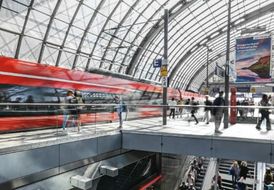Management approach and climate
protection target
We want to become climate neutral by 2040. This means that our target year is five years ahead of that of the Federal Government for climate neutrality in Germany. Our definition of climate neutrality complies with the net zero standard of the internationally recognized Science Based Targets initiative (SBTi) and thus follows a 1.5 °C path, which we committed to in 2022. We are also part of the UN’s Race to Zero initiative. Achieving a shift in the mode of transport to the rails is key to meeting Germany’s climate protection targets. Even as the transport sector moves towards electrification, the low levels of friction generated by wheel-rail contact mean that rail travel will continue to be the most efficient form of energy use.
Climate-neutral DB
In order to achieve our climate protection target, we are uniting the related activities across the Group under the umbrella of “Climate-neutral DB.” The project is developing greenhouse gas reduction pathways (phase-out plans), improving the transparency of planned measures and optimizing the solutions to the overarching challenges of green-house gas reduction. In addition to emissions from rail and road transport operations, emissions from buildings and stationary facilities are also considered. New climate-friendly technologies are being tested and piloted across the business units. The implementation of our starter packages for diesel phase-out and heat transition are also managed and monitored by the project team.
In order to achieve our climate protection target, to reduce our negative impact on the climate and to completely avoid any negative impact in the future, we have set ourselves ambitious milestones:
- By 2030, we will have more than halved specific greenhouse gas emissions (i.e. emissions in relation to performance figures such as volume sold) worldwide compared to 2006. We have selected the long duration of 25 years for our target on the basis of our very long-lived means of production, so that the effects of the various efficiency measures are better taken into account. In order to achieve our targets in 2030 and continue on the path to a climate-neutral DB Group, our main measures are to increase the share of renewable energies for our electricity-based transport services, to expand alternative drives and fuels and thus to phase out fossil fuels, to increase energy efficiency and introduce new mobility services, to make transport beyond rail climate-friendly from the first to the last mile. Almost 93% of our transport in rail passenger transport and rail freight transport in Germany (based on Ltkm) is already electric.
- We plan to increase the share of renewable energies in the DB traction current mix in Germany to 80% by 2030.
- By 2038 at the latest, we intend to have completely converted to green electricity for DB train operating companies in Germany.
- In our buildings and stationary facilities, we have also started to switch the power supply to renewable energy sources. From 2025, all of our depots, office buildings and stations in Germany will be fully eco-powered.
On our path to climate neutrality, we are in constant communication with our stakeholders. We cooperate, for example, with foreign train operating companies, including as part of the Shift2Rail initiative, which focuses on collaboration in research and development. We also regularly exchange views with political parties and participate in working groups of the Community of European Railway and Infrastructure Companies (CER).
By using green resources, we are saving greenhouse gas emissions. In Cottbus, we are currently building Europe’s most modern maintenance depot, setting new standards for speed of construction, innovation, energy consumption and climate protection. For the first time, we are using climate-friendly concrete for construction, which results in up to 30% lower CO₂ emissions during its manufacturing process.


